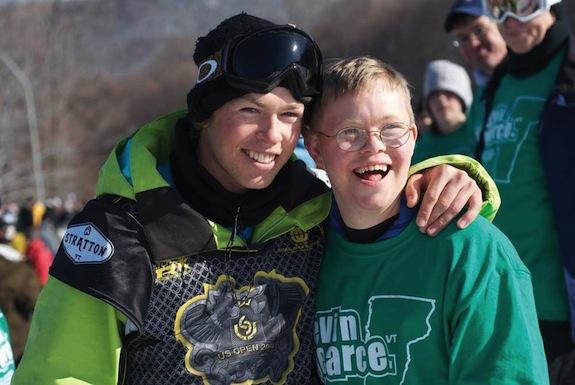‘The Crash Reel’ explores the dark side of action sports through Kevin Pearce’s powerful story
Auteur: Michael-Oliver Harding
Forget all those slick, brand-sponsored video montages of snowboarders doing the most unimaginable halfpipe McTwists and acrobatic tricks. Those glamorous, long-form commercials suppress the true danger of the sport in the name of visceral, adrenaline-pumping entertainment, with high-calibre athletes risking it all to put on a dazzling show. Freeskiing icon C. R. Johnson and Canadian halfpipe trailblazer Sarah Burke are just two of the many extreme sports athletes who are no longer alive to talk about it.
Director Lucy Walker’s The Crash Reel, which has just been longlisted for the Oscars, raises many complex questions about the nature of the sport, proving to be the soundtrack-free reality check the X Games community needed. The film documents the harrowing rehabilitation of champion U.S. snowboarder Kevin Pearce, who was considered Shaun White’s main rival in the lead-up to the 2010 Vancouver Olympics until he suffered a debilitating (and near-fatal) brain injury. Walker, who got involved in the project immediately after Kevin’s accident, chronicles the journey of a tight-knit family who pool together love, support and wisdom to help Kevin find his bearings and let go of his former life as a star athlete. As Kevin reevaluates his involvement with the world of action sports, Walker's doc hints at just how little the sports community is doing to address mounting safety concerns. Because as British BMX dirt jumper Stephen Murray says in the film: “They want to see people go out there and crash, because the crowds get excited…that’s what the crowd loves.” NIGHTLIFE.CA caught up with Walker after the film’s premiere at the Rencontres internationales du documentaire de Montréal.
NIGHTLIFE.CA: What was the initial draw for you as a filmmaker: the story of someone adapting to injury or the enormous risks taken by extreme sports athletes to continually raise the bar?
Lucy Walker: I’m interested in the world of extreme sports, and I was interested in people’s adaptation to injury. I met Kevin’s dad and became interested in making a film about someone adapting to disability – I think it’s a really interesting journey. I wasn’t sure how Kevin would adapt to life with a brain injury so I wanted to see what would happen. The more I got to know him and his family, the more interesting I found they were. You’ve compared the appeal of Kevin to that of mythical ‘90s heartthrob River Phoenix. Can you elaborate on that?
You’ve compared the appeal of Kevin to that of mythical ‘90s heartthrob River Phoenix. Can you elaborate on that?
I think Kevin is an incredibly beautiful and charming young man, incredibly gracious, talented and dedicated. I was a huge fan of River’s, as many people were, and was devastated by his death, and somehow I saw him in Kevin’s story! I don’t know why… Somehow, I saw that same incredible talent but a different kind of tragedy, a different kind of person…
You show the overwhelming support of Kevin's family, who play a determining role in his recovery, as well as in discouraging him from returning to the sport. Did you expect Kevin’s family to be as hands-on and mobilized as they were?
Usually, families step in when big injuries happen in life. The truly phenomenal thing, though, is that they're the most functional family I’ve ever seen on screen – they have one son with Down syndrome and another with a brain injury, and yet how they handle things is incredibly inspiring. They’re very loving and skillful in the way they interact with Kevin, and given the nature of his injury, you can see the incredible contribution that makes to his recovery.
The Crash Reel’s most sobering scene finds Kevin's new, snowboard-free life finally sink in after meeting Trevor, a fellow snowboarder who suffered two traumatic brain injuries which, by Kevin’s own avowal, “are totally invisible.”
I think it was one among quite a few wake-up calls; there were others. I think that when Kevin returned to snowboarding, he was shocked that his gift was gone. He knew that the delusion of his mind couldn’t override his awareness of his own body – he just couldn’t do the tricks anymore.
Your film is mostly a portrait of Kevin, but you also touch upon the broader culture of extreme sports, with its focus on dangerous stunts to make for a more thrilling spectacle. But how much risk-taking is too much? Your film doesn’t provide any easy answer to the question – what’s your personal take on it?
I think that tricks are fantastic, acrobatic and wonderful, but I’d also like to see them designed in a way that fewer (better yet – no) fatalities occur. Another death happened in 2013 – [champion snowmobiler] Caleb Moore at the X Games – and we’re seeing a rise in terrible crashes in extreme sports, with everyone going faster, thinking they’re invincible. It’s so innovative and beautiful, I really applaud the spirit and I love to watch their sport, but I don’t think you should be dying for it. Kevin’s buddy Luke Mitrani just crashed in New Zealand and is just lucky to be alive. It’s not a high-risk sport, it’s an extremely high-risk sport. I’m torn because I love the sport, but I also love the people doing it even more.
You’re already raising awareness within the snowboarding community with the LOVEYOURBRAIN outreach campaign. But what kind of advocacy efforts and concerted measures will it take to see such a high-profile action sport enact preventive measures that limit future tragedies?
I don’t know where exactly we need to draw the line, but I just wish people were having that conversation. I’ve been shocked by those who run action sports: nobody is talking about this, the kids aren’t even ensured. The fact that Sarah [Burke] wasn’t even insured at the time of her death is shocking to me and should be an outrage. Young people are risking so much and aren’t even offered basic protection in terms of their health.
The Crash Reel
Opens December 13 at Cinéma Du Parc
